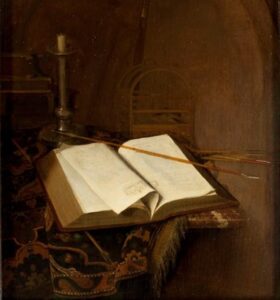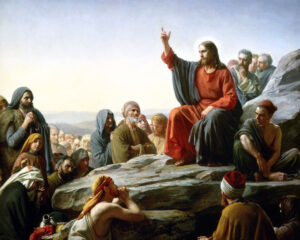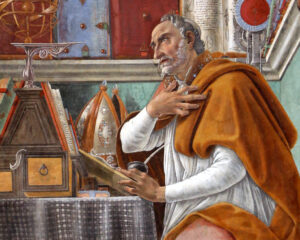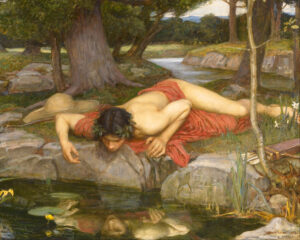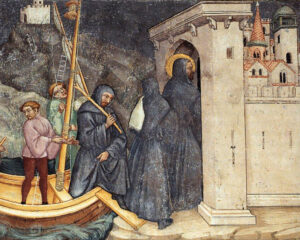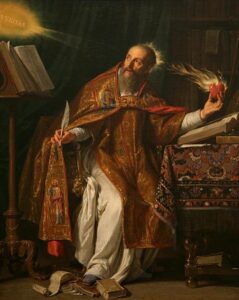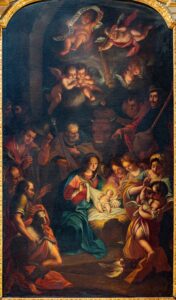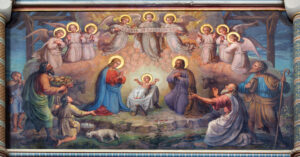See All
Mary and Joseph Travel to Bethlehem
Faith in the Shadows: The Life of Bl. Oleksiy Zaritskiy
10 Tips for Deeper Devotion
The Heavenly Glory of the Martyrs
The Mansion of the Soul
The Fatima Message and Martyrdom
How to Make a Spiritual Communion
Six Acts to Structure Your Daily Prayer
3 Graces of the Name of Jesus
How to Be Victorious Over Temptation
The 3 O’Clock Hour
Faith: The Shield of the Soul
10 Meditations on Death
Is it Okay to Watch Horror Movies?
Mastering the Mind and Imagination
What is Exorcism?
The Dangers of False Interpretations of Scripture
St. Stephen: The Protomartyr of Christianity
3 Steps to True Humility
Nine Aids for Securing Devotion
3 Joys of Heaven
Ten Hindrances to Devotion
It Is Not Enough to Be Virtuous
How Human Weaknesses Invite Spiritual Attack
The Incarnation Within the Mass
Doing All Things for the Love of God
Fear of Things to Come
An Exorcist’s Guide to Conquering Lust
Faith Not Opposed to Reason
Living the Message of Divine Mercy
What Is White Martyrdom?
Four Principles to Restore True Education
The True Story of Nicola Aubry
Lectio Divina: The Greatest Commandment
A Simple Path to Union with God
5 Remedies Against Anger
The Martyrdom of Non-Catholics
Jesus in Mary’s Womb
The Contemplation That Leads to Eternal Life
Three Kinds of Martyrdom
Lectio Divina: The Parable of the Sower
Awaken Our Sleep, Lord; Arouse Our Care
Lectio Divina on the Feeding of the Five Thousand
Bl. Veronica of Milan’s Vision of the Resurrection
What’s My Authority in Spiritual Warfare?
St. Bonaventure on the Power of Silence
Prayer Is Daring
Dangers of the Occult & Lessons from David’s Victory
The Devil’s Attacks on St. Gemma Galgani
Why Few Words Lead to Greater Holiness
Prayers to the Fourteen Holy Helpers
A Greater Gift Than Sacrifice
The True Church Must Be Ancient and Universal
Mary: Daughter, Mother, Spouse, and Handmaid of the Lord
Mary’s Sorrow for Her Son
The Devotion of the Saints to the Angelus
Moses’s Prophecy of Christ
The Secret to Unshakable Inner Calm
St. Joseph’s Privilege Among the Saints
How Poverty of Spirit Leads to Holiness
Sermon on the Sorrows of Mary
Acts of Charity Toward Your Neighbor
3 Consolations for the Struggling Soul
What Is Hell Like?
Remedies for Envy
The Flight into Egypt: A Lesson in Trust
Litany for the Souls in Purgatory
How Precious Was the Death of Mary in God’s Eyes
True and Sincere Confession
Spiritual Warfare: Angels, Saints, and Sacramentals
God’s Will: The Surest Way to Sainthood
Perfect Poverty: The Path to Gospel Perfection
Jesus Institutes the Sacrament of Reconciliation
True Self-Knowledge
Prayers to Your Patron Saint and Guardian Angel
Purifying the Soul for Union with God
Meditation and Prayer on the Assumption
The Humility of Mary
Seven Marvelous Graces of the Rosary
Spiritual Flowers in Mary’s Garden
Three Saints Who Battled Satan
The Humility of Mary
5 Incredible Facts About Mary
Self-Conquest: The Heart of Christian Perfection
Night Litany to the Blessed Sacrament
The Final Supper Together of Jesus and Mary
Miraculous Weeping Statues
Does Hell Exist Because God Is Angry?
The Most Necessary Virtue for Salvation
The Easier Road: Why Salvation Brings Joy and Sin Brings Sorrow
What Is the Immaculate Heart Devotion?
A Great Lord Requires a Great Service
Mary the Homemaker
Be Ruled by God’s Opinion
Four Virtues of the Intellect
Overcoming the Devil’s Weapons of Sadness and Boredom
Mary Magdalene, the Lost Pearl
Trusting God’s Hidden Work in the Soul
The Most Influential Dominican Books Through the Centuries
Interior Mortification: Restraining Self-Love
Saintly Advice on Humility
The Favorite Virtues of Our Lord: Meekness and Humility
Proof of the True Presence
The Law of Man’s Perfection in This Life
The Miraculous Anatomy of Man
Labor of the Mind, Not the Senses
How to Live Like St. Benedict
The Law of Man’s Perfection in This Life
Relics and Sacramentals: What’s the Difference?
Saint Albert the Great on the Soul’s Highest Perfection
3 Virtues of Conversation
The Eternal Worth of the Soul
10 Books You Need During the St. Benedict’s Day Sale
The Soul’s Greatest Hope
Spiritual Warfare Q&A
A Ranger Buddy at Your Six
St. Maria Goretti Forgives Her Murderer
The Seven Privileges of Mary That Bring Us Life
Guide to Cultivating Patience
Mary Shares All Gifts with the Lord
Why Homestead Life Is Natural to Man
Recollection: The Path to Union with God
How Purity Perfects Culture
Self-Will: The Devil’s Most Powerful Weapon
Stop Playing Victim
Gentleness Disarms Severity
Luther’s Sola Fide
The Meaning Behind the Ceremonies of the Mass
Five Lessons on Humility
12 Ways Death Leads Us to Holiness
Irreverence in Church
The Victim We Receive: Profiting Spiritually from the Mass
Heaven, Our True Home
The Blessed Rest That Awaits the Just
3 Prayers by St. Thérèse
The Special Virtues, Grace, and Glories of Joseph
Do Not Reject Your Small Crosses
When God Delays: A Lesson in Trust and Salvation
Who Interprets Scripture?
The Will of God in the Present Moment
10 Counsels from St. Francis de Sales
The Star of the Sea
Male and Female: How the Sexes Complete Each Other
The Path to Salvation: The Sacred Heart
Jesus Adores the Smallest Acts of Love
Why We Resist Confession—and How to Overcome It
Secular Masculinity vs. True Manhood
Sanctity in the Hidden Work of God
The Gifts of Baptism
The Ascension According to Bl. Veronica of Milan
Faith: A Treasure of Unspeakable Value
Who Was St. Joan of Arc?
Exercise on the Blessed Life of Christ in Heaven
5 Reasons for the Elevation of the Host
The Soul’s Longing: Understanding the Virtue of Christian Hope
Litany of the Sacred Heart of Jesus
Thy Will Be Done: True Humility Before God
12 Degrees of Humility vs. Pride
9 Aids for Securing Devotion
Why We Venerate Mary
Motivation for the Pursuit of Heaven
3 Holy Stances of Pope Leo XIII
The Nature of Devotion
Meditation on Jesus in Heaven
The Ninth Stone in the Crown of the Virgin
C.S. Lewis’s Argument for God
Mary, the Queen of Heaven
Quo Vadis: Peter’s Martyrdom
From Shepherd to Warrior
The Popes on Purity
The Wedding Feast at Cana
Gluttony vs. Moderation
The Virgin Mary and Spiritual Combat
The False 10 Commandments of Communism
Why Are Many on the Road to Destruction?
The Four Mysteries of Love
Mary: “The Great Mold of God”
Raphael Reveals the Role of Guardian Angels
Gabriel’s Angelic Salutation to the Blessed Virgin Mary
Guide to Scapulars
The Noble Saint Joseph and the Nativity of Our Lord
Guide to Divine Mercy
A Treatise of Divine Providence
All Goodness Is From God, Not Man
What Will We Do in Temptation?
Lectio Divina: The Bread of Life Discourse
The Happy Death of the Just
Why We Sing Alleluia
Two Ways to Advance in God’s Love
Easter Is Not Over
The Soul That Leaves This Life in the State of Grace
Mass Is the Most Sublime Form of Praise
Mary Present on Calvary
St. Gianna Molla: A Mother’s Ultimate Choice
Bl. Anne Catherine Emmerich’s Visions of the Pasch
The Role of Confession in Spiritual Warfare
Jesus Upon the Cross
The Secret of Fatima Explained
Jesus Carries the Cross to Calvary
Evidence for St. Joseph’s Heavenly Privileges
Visions of Christ from Blessed Veronica of Milan
Mary Receives the Eucharist on Holy Thursday
Angelic Assistance from St. Gemma’s Guardian Angel
How to Teach Children About Death
Loving Aspirations to Jesus in the Blessed Sacrament
Vision of the Scourging at the Pillar
Hymns for a Longing Soul
Why We Choose Sin and Damnation
Prayers for Families
Cultivating Catholic Art and Culture in the World
Guarding the Tongue with the Virtue of Silence
The Exchange of Peace and the Agnus Dei
How to Detach Yourself from Comfort
Prayers for Various Occasions and Needs
Jesus’s Three Sufferings in the Garden
What Is Poverty of Spirit?
Latin Hymns for Lent and Passiontide
Mary, a Rod from the Root of Jesse
Is the Mass a Sacrifice or Memorial?
A Saint’s Explanation of the Beatitudes
The Monks Try to Poison Saint Benedict
Prayers to Saint Benedict
Having a Humble Opinion of One’s Self
What Is Mortification & How to Practice It
Man’s Purpose on Earth
The Visions of Christ in the Garden
5 Lenten Prayers Revealed by Christ
The Principal End of the Passion
Jesus Is Mocked and Spat Upon
Christ’s Vision of the World’s Sins
Jesus Is Arrested
The Seven Last Words of Christ: Meditation on the Fourth Word
Lucifer Revolts Against God
“Do This in Memory of Me”
The All-Powerful One Word Prayer
Jesus Chose to Suffer
God’s Promises to Those Who Suffer Well
The Remembrance of Christ’s Passion
A Vision of the Lamb of God
The Life of Christ, a Pilgrimage
Saint Frances of Rome Converts a Dying Woman
How to Walk in God’s Presence
How to Cultivate Prudence
God’s Fatherly Care of the Just
Meditation Through the Five Senses
The Holy Names: Jesus, Mary, and Joseph
Pride Transforms Angels Into Demons
Of the Love of Solitude and Silence
Mary Mourns Her Son
A Meditation on the Passion of Jesus
The Four Temperaments of the Saints
Obedience to Our Spiritual Director
How the Devil Flatters the Faithful
Why Practice Silence?
The Song at the Scaffold
A Practice Necessary for All
Holy Habits to Thwart Demons
A Martyr for Marriage
The Interior Agony of Jesus
Jesus Stands Before Pontius Pilate
The Responsibility of the Faithful Versus the Heathen
Answering Questions About the Angels
The Promises to Devotees of the Sorrowful Mother
Faith Without Works Is Dead
The Death of Saint Joseph
The Perfect Love of God
5 Tips for a Holy Marriage
Standing Before A Mirror of the Soul
How to Pray the Rosary of the Seven Sorrows
How to Attain True Self-Knowledge
Is the Interior Life Selfish?
Types of Eucharistic Miracles
Opportunities to Practice Trustful Surrender
Sudden Death Without Preparation
Various Thoughts on Humility
The Beheading of John the Baptist
A Message to Those Who Claim Virtue Is Too Difficult
How to Flee from Impurity
The Greatest Among the Sons of Men
The Strength of Childlike Faith
Of the Miseries of This Life
The Call of Saint Joan of Arc
Of the Frailty of Our Life
Saint Teresa of Ávila’s Method of Prayer
The Benefits of God
The Graces of the Sign of the Cross
The Most Powerful Prayer
What Counts as Prayer?
Man’s Duty to His Neighbor
Meditation on the Mystery of the Eucharist
The Five Parts of Prayer
The Meaning of Priestly Vestments
The Peace of a Good Conscience
The Difference Between Legend and Myth
The Hidden Life of Jesus at Nazareth
Do I Need to Confess Temptations?
The Abasement of Jesus
Remedies Against Pride
A Name Where Salvation Is Found
The Threefold Woe of Sin
The Meaning of Mary’s Name
The Fruits of Prayer Joined with Consideration
The Way, the Truth, and the Life
The Solitude of Jesus in the Stable
Two Kinds of Saints
Jesus Became a Child to Win Our Love
Jesus Lying on the Straw
The Birth of Jesus
Joseph Goes to Bethlehem with His Holy Spouse
Grandeur of the Mystery of the Incarnation
Man’s Ingratitude at Christmas
Jesus a Prisoner in the Womb of Mary
The Infant in Swaddling Clothes
The Poverty of the Infant Jesus
Jesus Offered Himself from the Beginning
The Saints and the Holy Name
The Saints Praise the Eucharist
The Word Was Made Man in the Fulness of Time
Cardinal Richelieu’s Twenty Spiritual Counsels
Living for the Pursuit of Heaven
Litanies to the Holy Trinity
The Restorer of Our Souls
Latin Hymns for Advent
Holy Advice for Contemplative Living
3 Prayers to the Angels
Visits and Visions of the Infant Jesus
An Advent Sermon from Saint Augustine
The Last Misery of Man: Death
The Quickest Path to Perfection
The Eternal Word Being Great Becomes Little
King David’s Holy Silence
Jesus Enlightens the World and Glorifies God
Let Go of the Fleeting World
A Saint’s Sermon on True Humility
First Sunday of Advent
The Name Above All Names
3 Prayers to the Infant Jesus
Hatred Is Quelled By Love
A Guide to Devotion to the Sacred Heart
Aridity in Prayer
Offer Yourself at Holy Mass
A Special Prayer for the Love of God
The Rewards of Heaven and Punishments of Hell
A Mystical Vision of the Crowning with Thorns
How to Be Poor in Spirit
Choosing God Over Comfort
The Cross, The Wine Press
A Saint’s Exercise on the Incarnation
The Holy Marriage of St. Elizabeth and Louis IV
Meditation on Sin and Self-Knowledge
The Stigmata of Saint Gertrude
A Virtue Necessary to Follow Christ
Happy Victim
“My Father, I am Yours”
Prayers of Reparation
It Is Easy to Give Oneself to God
Upon This Rock I Will Build My Church
The Life of Bl. Anne Catherine Emmerich
The Chalice of the Last Supper
God Does All for a Soul of Goodwill
The Remedy to Venial Sin
Called to Humility
Useful Admonitions for a Spiritual Life
How to Help the Souls in Purgatory
What Does the Church Teach About Sacraments?
The Shroud of Turin Wounds
How to Celebrate Vigils and Lauds: According to St. Benedict
Begin Your Day in Prayer
A Little Brush in the Hands of the Artist
Cecilia’s Saintly Marriage
Devotion: The Gift of Oneself
Defeating Vainglory and False Piety
A Reflection on the Souls in Heaven
Exercise on the Three Degrees of Humility
Thirst of Jesus on the Cross
A Deceased Sister Visits Saint Faustina
St. Teresa’s Royal Highway
A Woman Clothed With the Sun
Jesus Alone Is Our Life
The Divine Details of the Miraculous Medal
Indulgences and Graces Attached to the Rosary
The 15 Prayers of Saint Bridget
The Mystery of Love According to Fulton Sheen
Father, Forgive Them
The Eternal Love of God for Us
Why Pray in Latin?
A Crocus Flower for Our Lady
Redemptive Suffering
How to Offer Each Decade of the Rosary
How to Overcome Annoyance with Others
Who Is Mary?
Fulton Sheen on Marriage
How the Dark Night Enlightens the Soul
Levels of Demonic Activity
The Prince of the Heavenly Host
Resisting Temptation
Exercise on Venial Sin
Hell’s Four Torments
Perfect Consecration to Jesus Christ
True Motherhood
The Agony of Jesus
The Greatest Love
Beloved Prayers to Our Lady
Padre Pio Receives the Stigmata
A Prayer Among Prayers
Holy Silence
The Imprinting of the Stigmata of St. Francis of Assisi
The Ruins and Remedies of Sloth
A Virtue Necessary for Salvation
Common Sufferings of Stigmatists
Where Words Fail, Silence Prevails
The Powers and Limits of Demons
The Heart of Mary
10 Virtues of Mary
Fighting the Good Fight with Perseverance
Hallowed Be Thy Name
Meditating on the Trinity with Saint Ignatius
Unity with the Divine Will
The Words of a Dying Man to Jesus Crucified
Guidelines for Eucharistic Adoration
How God Sends Temptations for Our Good
The Fruits and Merits of Devotion to Jesus’s Passion
Our Lady of Sorrows: Consolation for All
How to Preserve Recollection of Spirit
Divine Adoption
Deny Yourself and Follow Me
Ten Lessons On Humility
3 Powerful Prayers In Times Of Need
The Despised Heart Of Jesus
5 Saintly Quotes On Humility
Stewards Of Creation
Meditation On Mary Immaculate
The Little Way
The Fruit Of Prayer And Meditation
Blessed Are You Among Women
The Longing Of The Divine Heart
Preserve Childlike Faith
Praying With Persistence
Meditation On Heaven And Hell
The Assumption And Crowning Of Mary
Spiritual Counsel for the Sick
What Is The Sin Of Spiritual Luxury?
Visions Of Mary’s Childhood
Eucharistic Adoration Through The Ages
The Graces of Mortification
St. Louis De Montfort's Holy Rosary
Saint John Vianney’s Battle With Satan
The Heart Of Prayer
A Saint’s Guide To Gratitude
Our Lady, Radiant As The Sun
Act Of Consecration To Mary
Adoring Jesus With The Saints
The Mental Sufferings Of Christ
The Safeguard of the Virtues
How to Make an Examination of Conscience
Meditation on Mary Our Mother
The Origin of the Rosary
The Devil’s Greatest Lie
A Visit to the Blessed Sacrament
Daily Surrender to God
The Day of Eternity
Playing Princes
Conformity to God’s Will in All Things
The Gifts Of Heaven
The Divine Action Is Always Present
Avoiding False Compassion
Words of the Apostle of Charity
The Twelve Degrees of Humility
God Wills Our Good
Novena Of Our Lady Of Mount Carmel
Saint Bonaventure: The Second Word
Selfless Prayer
5 Powerful Prayers To St. Joseph
Lessons From The Prodigal Son
Saint Benedict’s 12 Degrees Of Humility
Meditation On Death And Judgment
Bearing The Defects Of Others
Our Lady Of Perpetual Help
The Goal Of Prayer
A Guide To Obedience
The Sufferings Of Our Savior On The Cross
Meditation On The Angels
Sanctifying Grace – Divine Blood
Virtuous Friendship
Prayers for Devotion to the Precious Blood
How To Converse With God
The Key To The Heart Of Jesus
The Holy State Of Abandonment
10 Steps Of The Mystic Ladder
Consolations During Mortification
Power Of The Holy Face Over Sinners
The Clergy’s Calling: Instruction From Saint Gregory The Great
Mortification In All Things
Joy And Peace Through God Alone
Sacrifice, The Foundation Of Sanctity
Cultivating Humility Towards Others
The Heart Of Jesus In The Blessed Sacrament
The Wisdom Of Angels
In The World, But Not Of It
The Four Marian Dogmas
Five Powerful Marian Prayers
Participating In The Divine Nature
Chosen As The Spouse Of Our Lord
Evangelizing By Example
The Magnet Of Souls
Christ Establishes Confession
Sighs For Our Heavenly Home
Saint Joseph’s Holy Fear
True Devotion And The Image Of The Sacred Heart
The Holy Cure For Despair
The Priest: A Creation Of Infinite Love
A Vision Of Heaven
Prayers For The Struggle Against Sin
Prayer Of The Golden Arrow
Love Of God For Man, And Of Man For God
Meditation on the Visitation of Mary
Five Saintly Counsels
Meditations on Creation
Guarding The Heart Against Temptation
St. Bede’s Account: The Black Book Of Crimes
Prayer Is Necessary for Salvation
The Depth of Mary’s Love for Man
Rita Of Cascia: Saint Of The Impossible
Friendship In Heaven
The Saints’ Guide To Patience
Meditations on Mary
The Glories And Graces Of The Rosary
A Will Perfectly Resigned
The Saints’ Guide To Chastity
Our Lady Of Fatima
Mary As A Model For Motherhood
Dark Night Of The Soul
The Ascension of Jesus: Favors Granted to Mary
The Titles Of Mary
The Ten Virtues Of Mary
May Crowning
The Soul of the Soul
Who Is Mary?
The Radiant Lily Flower
The Pope Of The Suffering
Saint Catherine Of Siena: On Prayer
Prayers Before The Blessed Sacrament
The Pleasures Of Heaven
Patience: A Virtue Flowing From Fortitude
A Reflection On The Final Judgment
Christ Is With Us Always
Eucharistic Adoration Through The Ages
Making A Spiritual Communion
Prayers For Eucharistic Adoration
Invitation To Visit The Blessed Sacrament
The Burial And Resurrection Of Jesus Christ
Three Eucharistic Miracles
Jesus Crucified Is Our Only Hope
St. Gemma Galgani Receives The Stigmata
Who Is The Holy Spirit?
Easter is Completed by Pentecost
A Feast Of Great Power
The Eternal Father’s Love
The Graces from the Passion
The Hope of Salvation
The Happiness of Heaven
Meditation for Easter Monday
The Interior Suffering of Jesus Christ
Fortitude: A Virtue to Defend the Soul
Five Miracles Attributed To The Medal Of St. Benedict
The Burning Love Of Mary And Joseph
How to Pray Well
Confession: A Weapon In The Battle For Souls
The Saints Praise The Rule Of St. Benedict
Prayer To The Seven Sorrows Of Mary
Saint Joseph’s Happy Death
The Blessed Mother at Christ’s Passion
Five Steps Of Making The Sacrament Of Confession Worthily (Part II)
Five Steps Of Making The Sacrament Of Confession Worthily (Part I)
Mary’s Lamentation at the Death of Her Son
Three Miracles Of Saint Benedict
Meditations for Holy Week
The Veil Of Veronica
St. Joseph From The Eyes Of Our Lady
Jesus Confined In Prison
The Home Of Saint Joseph
The Denial of Saint Peter
Meditation on the Scourging at the Pillar
Cultivating Compassion
Five Powerful Protections From Demons
Zeal for Souls
The Unseen Work of Your Guardian Angel
The Battle for Our Eternal Destiny
Occasions of Sin: What They Are and How to Avoid Them
Advice for Fruitful Meditation on the Passion
Uniting Our Sorrows to Christ
An Exercise of Abandonment to Divine Providence
Three Marian Prayers for Humility
Ash Wednesday With The Saints
Consolation During Temptation
The Necessity Of Meditation
The Hidden Graces Of The Holy Name
Preparing For Lent: The Seven Penitential Psalms
A Guide To Good Confessions
Preparation For The Eucharist
Jesus and the Good Thief
Three Lessons on Humility
Growing In Perfect Charity
Distractions In Prayer
Take Up Thy Cross
The Gift of Reason
Defeating Man’s Evil Inclination
Saintly Quotes on Virtue
Stilling the Storm of an Anxious Soul
The Proof of a True Lover
What Should We Do When Wounded By Sin?
Delight In the Presence of The Lord
The Most Valuable Works for God
Four Practices in Silence
Angels: Bound By Chains of Love to God
From Beast to Man
St. Michael at Mass
God’s Cleansing Light
Of Mary, There Is Never Enough!
For He Hath Given His Angels Charge Over Thee
An Ardent Desire for the Beloved
Jesus Suffered To Gain Our Hearts
Shepherds Come to Adore The Newborn King
The Mystery of the Incarnation
The Herald of the Incarnation
Christ’s Mystical Body at Christmas
The Decay of Venial Sin
The Voice of The Gospel
The Seraphic Virtue of Saint Joseph
The World in Danger Saved by the Holy Name
Five Daily Graces from Your Guardian Angel
Why God Wants Us to Pray Prayers of Petition
He Judges with Clemency
Jesus, the Man of Sorrows, from the Womb of His Mother
Mass, the Renewal of the Birth of Christ
Preparation for Successful Meditation
The Mystical Life For Times Like These
The Perfect Lowliness of the Incarnation
Solitude with the Communion of Saints
The First Pope’s Instruction On Suffering
Confidence In God’s Providence
Two Kinds of Lukewarm Souls
The Power of a Child’s Prayers
St. Gertrude Praises the White Lily
Swift And Perfect Obedience
Loving Christ Without Consolation
The Rosary: Relief for the Poor Souls of Purgatory
St. Gertrude The Great
The Necessity of Adversity
True Devotion to Our Lady
God’s Care For The Temporal Needs Of The Just
The Battle For Our Eternal Destiny
Transforming Despair Into Humility
Christ Thirsts for Man’s Charity
Three Sources of Spiritual Aridity from St. Teresa of Avila
The Incomplete Repentance of Judas Iscariot
The Forgotten Souls of Purgatory
Blessed Helen Duglioli
When God Does Not Answer Prayers
All Souls’ Day
A Look At Sainthood
The Saintly Shepherdess: St. Germain Cousin
Mary, Our Model of Silence and Humility
Man: The New Angel
The First Shall Be Last
The Centurion’s Conversion at the Cross
The Company of Hell
You Have Made Us For Yourself
The Ave Maria
The Holy Eucharist: A Love That Knows No Bounds
Mental Prayer Unites Us To God
With Anxious Love Inflamed
Self-Denial: The Perfect Prayer
Am I Poor In Spirit?
Revering, Loving, and Cooperating with Your Guardian Angel
Worldly Melancholy Is Defeated By Spiritual Joy
The Wonderful Effects of Divine Love
A Sacrament of Love
The Medicine for Salvation
Oh, How He Loves You
The Compassion of the Mother
St. Catherine of Alexandria: A Beauty not of this World
Evil Exists Only in the Good
Rejoicing After the Eucharist
Christ the Beloved
Action Made Fruitful by the Eucharist
The Unavoidable Battle: Fight or Die
Gentleness Toward Ourselves
Slaves to the Culture of Death
The Virtue Of Simplicity
Christ’s Victorious Last Words
Seeking the Beloved Amidst the Solitude
Humility: The Greatest Good
To Imitate Me, Love My Mother
Why God Does Not Answer Prayers (Part II)
Why God Does Not Answer Prayers (Part I)
Confession: A Weapon In The Battle For Souls
The Sacred Sights, Scents, and Sounds of the Mass
God Reveals His Plan For The Virgin Mary To The Angels
The Two Great Means for Becoming Holy: Desire and Resolution
The Virtue of Virtues
The Holy Mass is the Sacrifice of Christ
A Crimson Rose for Sinners
True Contentment in This Life and the Next
A Royal Example for the Laity
The Truth About Temptation
Disdain For Worldly Things
The Infant Jesus Present in the Eucharist
Meditation On The Obedient Death Of St. Joseph
The Incomprehensible Love of the Creator
We Do Not Ask Enough
My Soul Doth Magnify The Lord
The Infinite Beauty of God
The Necessity of Mary: The Inseparable Spouse
The Confidence Of The Just
Receiving Eucharist from the Foot of the Cross
Taming the Three Heads of Desire
Meditation: A Door for Divine Grace
Acquiring the Spirit of Prayer
Jesus Crucified to the Heart of the Christian
Holy Prayer: A Weapon for Every Adversary
The Power of the Our Father
A Prayer To The Queen Of Heaven
Graces More Sublime than Miracles
Called By Name
The Chalice He Offers Us
The Greatness Of Courage
Mighty Humility
Shaping the Rhythm of Life
To Conquer Through Love
A Prayer Like No Other: The Rosary
Pope Pius X and Frequent Communion (Part II)
Pope Pius X and Frequent Communion (Part I)
Steps to Sainthood: Thanksgiving for Our Creation
The Fruits Of Mortification
The Debate of Language in the Liturgy
Faith Without Works is Dead
Forsaken by All: A Revelation of Jesus on the Cross
Take Up Your Cross
A Sweat of Blood: Jesus Ignites the Lukewarm
One Word Meditations
Spiritual Sloth
On the Fire of Hell
The Chalice Used at the Last Supper
Faith is a Gift of God
The Prayers at the Foot of the Altar
Our Lady of Akita
Heaven and the Religious Life
Charity to our Neighbor in our Thoughts
The Sentence of the Just and the Wicked
Wisdom for Spiritual Warfare
To Serve The World Is A Cruel Slavery
The Devil Came To Ars
Peter of Prague and Tradition
Both Martha And Mary
Music for the Eucharistic Sacrifice
How The Saints Acquired The Spirit of Prayer
The Little Way and Teaching Others
Mary’s Two Greatest Desires
The Reality of Sins Against The Sixth Commandment
Perfection
War Within the Soul
Devotion to the Sacred Heart: The Source of the Eucharist
Four Ends of Prayer
Purification and General Confession
Pride and Humility According to Fulton Sheen
The Four Types of Pride
The Necessity of Imitation of the Sacred Heart
Discerning What Belongs To Us
Pride and The Temperaments
Purification from the Affection to Sin
Corpus Christi, Protestantism, and the Real Presence
The Words of God are Not Heard with Humility and Many Weigh Them Not
Hints on the Interior Life for Active Workers
Courtships That Produced Saints: Bernard and Ellen Casey
The Golden Hail Mary
Devotion and Dryness
Wisdom
The Daughters of Sloth
On Unworthy Communion
Oral Tradition Is Not Corrupted Over Time
Light as a Symbol of Grace
Virtues are to be Acquired One at a Time and By Degrees
The Soul’s Choice of a Devout Life
On the Power of the Prayer of Children
Mare, María, Martínus
On the Great Desire of Jesus Christ to Enter into Our Hearts in Holy Communion
What the Church Needs According to Pope St. Pius X
To Be Heard With Humility
The Medieval Socio-Economic Order
Fortifying Virtues
The Cruel Worm of a Guilty Conscience
Trust When We Lose Spiritual Consolation
The Blessed Virgin, the Eastern Gate
The Atheistic Manifesto of Freemasonry
Grace, Gratitude, and Prayer
The Perfect Well-Being of the Souls in Heaven
The Obedience Of Disciples
The Bridge
Satan’s Hatred for the Mass
Attention at Prayer
The Resurrection of Her Son
Why He Descended Into Hell
The Risen Lord Before The Ascension
Alleluia, Christ is Risen!
His Own Power: The Glorious Resurrection
The Seven Last Words of Christ: Meditating On The Sixth Word
The Oblation and The Last Supper
The Veil of Veronica and the Passion
Idleness Is An Enemy Of The Soul
The Simple Soul Loves the Cross
The Arrest of Christ
The Seven Last Words of Christ: Meditating on the Third Word
Jesus Goes To Jerusalem
St. Teresa of Avila’s Concept of Meditation
On Why A Crown Is Fitting For Our Lady
How the Blessed Will Go Up Into Heaven After the Judgment: (Part II)
Path of Perfection
The Life of St. Benedict: Conquering the Flesh and the Devil
The Imitation of Saint Joseph
St. Patrick’s Discouragement Amidst His Labors
Do You Love the Virtue of Humility?
The Betrayal of Christ and His Prayer in the Garden of Gethsemane
Joseph’s Virginity: A Model for Men in Every State of Life
End of Mental Prayer
Witness Of Humility: Washing The Apostles’ Feet
The Final Judgment
Spiritual Pride
Pride, the Mother and Queen of the Vices
Growth in Humility: Which Virtues Do You Lack?
How the Blessed Will Go Up Into Heaven After the Judgment: (Part I)
Mental Prayer
Growing in Sanctifying Grace
How Often Should We Receive Communion?
The Seven Last Words of Christ: Meditating on the Second Word
Catechism Of The Council Of Trent: “Suffered Under Pontius Pilate, Was Crucified”
The Seven Last Words of Christ: Meditating on the First Word
Sermon for Ash Wednesday: Fasting
The Holy Face of Jesus: Shrove Tuesday
The Secret Impetus Behind St. Jacinta’s Mortification
The Interior Castle: The Gate of Meditation and Prayer
Meditation on Retreat: Who Are You?
Admonitions Useful for Purifying the Heart
Habitual Grace
The Desire to Become a Great Saint
Heartfelt Prayer: The Miracle of St. Scholastica
Mindfulness of Death: A Sure Remedy to the Vices
Catechism Of The Council Of Trent: “I Believe In God, The Father Almighty, Creator Of Heaven And Earth”
The Interior Castle: Chapter 1
Ten Resolutions to Aid the Spiritual Exercises
A Vivid Dream and the Beauty of Nature
The Presentation of the Lord through the Eyes of the Mystics
What is the Most Ancient of Christian Devotions?
Hell and the Revelations of a Holy Nun
The Virtues and the Gifts: Supernatural Actions
Ignorance and Neglect of the Interior Life
Christian Perfection and External Works
Devotion For Every Vocation
Consideration of One’s Own Death
The Blessed Eucharist and the Real Presence
Returning Another Way
The Priest: A Eucharistic Victim
Pope Benedict XVI's Spiritual Challenge
The Holy Names of Jesus, Mary, and Joseph
Meditations on Death
A Child is Born
Meditating on the Nativity
A Christmas Sermon: Part II
A Christmas Sermon: Part I
The Nativity through the Eyes of St. Joseph and Our Lady
The Coming of the Divine Infant
Advent Calls Us to Silence: Part II
Advent Calls Us to Silence: Part I
Miracles of the Daily Rosary
The Fourth Week of Advent: The Silent Invitation
The Humility of St. John the Baptist
St. Teresa of Avila's Five Steps of Meditation
Dark Night Of The Soul: The Imperfection Of Beginners
The Third of Week of Advent: Gaudete!
The Visions of St. Juan Diego
On Interior Conversation
Discourse On Mary’s Immaculate Conception
Escape from Communism: the Bella Dodd Conversion Story
The Joyous Feast of St. Nicholas
The Second Week of Advent: Prayer Means Progress
The Advantages Attached to Temptations and Afflictions
The Christian Virtue of Meekness
Advent Recollection: The Cave Of Bethlehem
Perseverance in Prayer
The Beginning of Advent: Preparing for Christmas
Familiar Friendship with Jesus
Thanksgiving Meditation: Gratitude to Jesus Christ
Inequality in Friendship
Reflection on the Feast of St. Cecilia
Confession is the Sacrament of Mercy (PART II)
Discourse on the Presentation of Mary
Confession is the Sacrament of Mercy (PART I)
Virtues of St. Gerard Majella
Spiritual Desolation
Prayers Suitable to the Sick
Is the Brown Scapular “Biblical”?
How to Make Mary Live and Reign in Our Souls
Prayer Secures God’s Blessings on Our Labors
A Prayer to the Blessed Virgin Mary for Her Help in the Hour of Death
Encouragement Under Trials
Remedies Against Sloth
The Rapidity of Time
God Resists the Proud
Remembering the Dead on All Souls Day
All Saints Day Reflection
"All Hallows' Eve" is a Catholic Day
Temptation
To Attain Perfection We Must Patiently Endure Our Imperfection
The Devil’s Powerlessness
On Meekness
Trustful Surrender in Poverty and Its Hardships
Saint John Paul II and the Gift and Duty of Our Talents
Resting in God Above All Goods and Gifts
We Must Pray with Confidence
Marriage as an Analogy for Marian Consecration
Detachment from Creatures
Consuming Much Salt
The Miracle of Fatima: October 13, 1917
Patience in Sickness
What the Roman Canon Teaches Us about Predestination
Penance at Lourdes and Champion (PART II)
Penance at Lourdes and Champion (PART I)
The Words of Christ from the Cross
Mystical Combat Is the Answer to the Coming Storm
Reflection on the Feast of St. Francis of Assisi
Our Sanctification Through Mary
The Story of a Soul
77 Graces and Fruits to Be Derived from Devout Attendance at Holy Mass (PART II)
77 Graces and Fruits to Be Derived from Devout Attendance at Holy Mass (PART I)
When God Sends Us Trials
Charity Towards the Poor with the Help of the Lord
Life of Reparation: Did Christ Save the World Chiefly by Sermons or the Cross?
Temptations
The Privilege of Virtue: the Confidence of the Just
St. Gemma Galgani: Twentieth Century Stigmatist
Mortification
We Must Find Mary
Knowledge Of God And Friendship
Serenity in This Life
Preserving Peace of Soul in Times of Trial
The Elevation of the Mind to God
St. Peter Claver: Slave of the Slaves
Meditation On The Feast Of The Birth Of Mary
Remedies Against Anger and Hatred
Perseverance in Prayer
On Work and Doing Ordinary Actions Well
Advantages from Conformity to the Divine Will
The Value of Good Spiritual Reading
Advancement in Holiness
Padre Pio, Superhero, Makes Another Save
The Spiritual Influence of St. Antony of the Desert
Trials and Punishments are Blessings From God and Proof of His Mercy
The Supernatural Character of the Priest
Peace of Soul and the Spirituality of St. Martin de Porres
The Holy Eucharist – Past, Present, and Future
The Proof of True Humility is Patience
God Does Not Abandon Us at the Hour of Death
Meditation on the Vestments of the Mass
Inspiration from St. Stephen of Hungary and His Crown
Sins of Habit
Discourse on the Feast of the Assumption
The Importance Of Mary In The Spiritual Order (PART II)
Resignation to the Divine Will
Remedies Against Gluttony
The Glories of Heaven: The Supernatural Gifts that Await Body & Soul in Paradise
The Mercy of God on the Return of a Sinner
God Controls All Events, Whether Good or Bad
Introduction To The Dark Night Of The Soul
The Devotion of St. Aloysius to His Guardian Angel
The Shortness of Life
The Importance Of Mary In The Spiritual Order (PART I)
The Vast Life of God and the Precious Blood
Humility is the Remedy for Evil
Why Pray in Latin?
It is Sweet to Serve God
What is the Interior Life (PART II)
The Youthfulness of Mary the Mother of God
What is the Interior Life (PART I)
On Preparation for Communion
Mary is the Hope of All (PART II)
Sundays and Holydays in the Spiritual Life
St. Gerard Majella’s Devotion to the Saints and Angels and Particularly to St. Michael
Mary is the Hope of All (PART I)
Distrust of Ourselves Under Temptation
We Should Abandon Ourselves to God in Life and in Death
St. Benedict On Humility
The Mystery of the Precious Blood
St. Albert the Great on the Color of Our Lady's Hair
The Martyrdom of St. Maria Goretti
The Mortification of the Passions
Freedom of Heart According to My Imitation of Christ
Remembering Leo XIII’s Arcanum—On Christian Marriage
Devotion to the Sacred Heart of Jesus According to St. Gertrude
The Spiritual Significance of the Feast of Saints Peter and Paul
Practice of Conformity to God (PART II)
The Power of Guardian Angels
Remedies Against Pride (PART II)
Exercise Great Care in the Selection of Your Spiritual Reading
Motives Impelling Devotion to the Sacred Heart
How We Are to Fight Against Impurity
The Assault on the Holy Eucharist
Consolations and Dryness in Prayer
Practice of Conformity to God (PART I)
The Archconfraternity of the Holy Face: Why Should One Join?
Effects of Holy Communion
God Deserves to be Supremely Loved
From the Imitation of Christ: Amendment of Life
The Secret of Our Lady and the Reality of Hell
Remedies Against Pride (PART I)
Love of Jesus for Sinners
Pentecost Meditation on the Holy Spirit (PART II)
Pentecost Meditation on the Holy Spirit (PART I)
True Devotion to the Sacred Heart
Desire for Spiritual Things
Active Works and The Interior Life: What They Mean
God's Fatherly Care of the Just
Fighting for Your Child's Eternal Salvation
Uniformity with God’s Will
On Scruples in the Spiritual Life
Do Not Let Your Hearts Be Troubled
The Peace that Comes from Christ
St. Rita of Cascia: One of the Incorruptibles
Proper Dispositions of the Reception of Holy Communion
Penance and Mortification
True Peace Found in God Alone
Making Good Use of God's Graces
Pregnancy and Fulfilling the Homeschool Mission
Metanoia and the Spiritual Experience of Pilgrimage: Part II
May 13th and the Consecration of Russia
The Children of Fatima and Devotion to the Papacy
On the Providence of God by Alice von Hildebrand
The Author of the Salve Regina: the Stories of Two Great Lovers of Mary
Interior Peace & Sadness
To Attain Perfection We Must Endure Our Imperfection
Metanoia and the Spiritual Experience of Pilgrimage: Part I
Spiritual Realities of the Papacy & the Priesthood
Saint Monica: Christian Woman Married to a Pagan
Freedom as a Divine Gift and Duty
The School of Calvary & the Necessity of the Cross
Zeal for Souls
Hope and the Interior Life
We Are At War with Agents of the Devil
Homeschooling for Heaven's Sake
Divine Mercy Sunday and St. Faustina's Message
He Who Was Dead Has Risen
When Christ Our Pasch was Sacrificed
The Resurrection Of Our Lord
Easter Meditation: Christ Was Made Sin for Us
Sermon for Good Friday on the Passion of Christ
Holy Thursday Meditation on the Blessed Eucharist
The Chalice Used At The Last Supper
The Sufferings of Christ According to the Shroud of Turin
On the Last Things
Prayers More Than Tears: On Devotion to the Holy Souls
The Excellence of Abandonment to God
Lenten Meditation on the Cross
On the Effects of Holy Communion
Patience in Temptation
Thoughts on Spiritual Direction
The Peace Enjoyed By The Just
The Choirs of Angels & Guardian Angels
Remote Preparation For Mental Prayer: Forgiveness Received And Extended
Understanding the Spiritual Power of Holy Water
Putting the Peace Plan of Our Lady into Action
To Consecrate Russia—and Oneself and One’s Family
A Prayer for Detachment from All Earthly Things by Thomas à Kempis
The Goal of Catholic Social Teaching as the Foundation for Spiritual Growth
St. Benedict On The Observance Of Lent
Man Your Post: Learning to Lead Like St. Joseph
A Man Cleansed by God: A Novel Based on the Life of St. Patrick
Awareness of Angels
The Christian’s Aim
Lenten Meditation on Eternal Happiness by St. Francis de Sales
Pursuing Perfect Apostolic Life and Contemplation
The Inspiring Story of Blessed Gerard: Founder of the Order of Malta
The Reality of Exorcism and Demonic Possession
Spiritual Guidance in Time of War
Lenten Reflection from Mother Miriam of the Lamb of God
Reliance on Our Lady and the Saints
The Necessity of Prayer
St. Francis de Sales Sermon for Ash Wednesday
St. Benedict’s Admonition to Pray the Divine Office
The Vigilant Heart: Remote Preparation For Mental Prayer
Examen on Humility Toward Our Neighbor
Examen on Humility Toward Our Neighbor
Homeschool Advice for Catholic Moms
Purgatory and the Church Suffering
Mourning Those Whom We Have Lost
Thomas à Kempis on Prayer
The Spiritual Reality of the Church Militant
St. Gemma’s Gift of Supernatural Prayer
Our First Vocation is to Be Holy
The Happy Death of the Just
Appealing to Saints Cyril and Methodius—Heralds of Light and Faith
The Necessary Practice of Mortification
The Draw of the Old Mass in Latin
Feast Days and Celebrating the Memory of Saints and Martyrs
The Proof of True Humility is Patience
On Visiting Jesus Christ in the Blessed Sacrament
The Excellence of Abandonment to God
That We Need Not Fear Satan
St. Joseph: Model of Catholic Manhood
Humility As the Foundation of All Virtues
Inspiration from the Ukrainian Martyrs
The Simple Spirituality of the Little Apostle Jacinta of Fatima
Spiritual Retreats Need Piety And Modesty
Spiritual Contagions: the Dangers of Modernism
Deferring Conversion Until Death
"I Wish to Become a Saint"
Homeschool Foundation for the Spiritual Life and Liberal Arts
The Value of Spiritual Reading
The Virtue of Humility: Part II
Let Us Give Ourselves Completely to Mary
Spiritual Guidance and Consolation for Married Couples
Self-Abandonment As The Quickest Way To Love And Perfection
The Grace With Which The Holy Spirit Fills Devout Souls
We Should Draw Profit from Our Faults
On the Mercy of God
The Virtue of Humility: Part I
New Year’s Resolutions: Adopting a "Theme" for the Year
The Epiphany Cake on the Twelfth Day of Christmas
The Best Resource for Teaching Boys to Serve the Latin Mass
Go, and Search Diligently for the Child
Passing on the Tradition of the Christmas Proclamation
Five Inspiring Reads to Pour Your Soul Into for 2022
The Special Privilege of Three Masses on Christmas
A Famous Christmas Carol Written by St. Alphonsus Liguori
The Poignant Grief of the Holy Innocents
Let Us Go to the Grotto of Bethlehem
The Glow from the Midnight Cave: Memento Bethlehem
Christmas Midnight Mass Sermon by St. Francis de Sales
Catholic Elements of Home Alone
Mary as the Ark of the Covenant
Christmas Meditation on the Sacred Infancy of Jesus
Mystical Aspects of the Mystery of Christmas
The Sacredness of the Priesthood and Religious Life
Welcoming Advent in the Home as a Pre-Christmas
Benedict XVI and the Call to Holiness
Our Lady of Good Help: Antidote for a Church in Crisis
Eternal Salvation: a Meditation
The Secrets of the Sacred Heart
Holy Matrimony: Praying for a Future Spouse
The Immaculate Conception According To Anne Catherine Emmerich
What Think You of Poetry?
Fostering Catholic Culture: Celebrating the Feast of Saint Nicholas
Advent – Time For “Holiday Parties” Or Little Lent?
Spiritual Direction—What Is It?
The Greatest Subject in All the World: the Blessed Eucharist
"Road Map" to the Survival of the Catholic Family
Advent: A Time for Preparing One’s Heart to Welcome the Infant Jesus
The Blessed Boon of Homeschooling
Thanksgiving Day Meditation on Gratitude
Baptism, Confession and the Adult Child’s Return to the Sacraments
Homeschooling Along the Path to Eternal Life
Why Gregorian Chant is Supreme (Part II)
Julia Meloni’s The St. Gallen Mafia: Crucial Insights into Pope Francis
Preserving Catholic Culture in a Hostile World
Introducing Children to the Liturgical Seasons
How Catholics Fall into Liberalism
Solitude and the Parents of St. Faustina
Exposing the St. Gallen Mafia: Exclusive Interview with the Author
Humility is Essential to All to be Saved (Part I)
The Month of All Souls: 5 Ways Catholics Honor Their Dead
Restoring Prayer in the Home
The Quest for Mary the Historical Mother of Jesus
God Wills Our Good
The Holy Eucharist and the Parents of St. Thérèse
How To Advance In Holiness: Lectio Divina
Teaching Your Children the Devotional Life
The Appeal of Reading the Saints to Children
Thomas Aquinas: 7 Little-Known Miracles of the Angelic Doctor
Why Beauty Matters
The Sublime Image of Our Lady in Art
Piety is the Virtue of the Warrior
Why Gregorian Chant is Supreme (Part I of II)
John Paul II’s Feast Day and Historic Landmarks
The Dogma of Hell is the Most Terrible Truth
Humility: A Hidden Source of Strength
Spiritual Heroes and the Threat of Sadness
Mary as the Special Patroness of the United States
The Weighty Subject of God's Judgment
Making Dystopia: The Rise of Ugly Modern Church Architecture
Matrimony as a Sacred Contract and Sacrament
A Call for Courageous Priests
The Fair Beginning of a Time: Brave Knights
Preparing Your Child for Death
Our Lord's Hidden Wound
God Wills You to Be Happy
The Annunciation (Part III)
St. Michael's Help is Urgent for Today
Unchained
TAN Academy as the Living Order of Creation
Parents as Primary Teachers
From Mother's Heart to Your Home...
Look Upon Your Child as An Immortal Creature
The Clash of Angels (Part II)
On Discerning the Treasury of Sacred Music
A Utilitarian or Saintly Marriage?
The Last of the Martyrs of the Coliseum
Parents as Spiritual Guides
Before Time (Part I)
The Catholic Response to Moral and Religious Deterioration
TAN Academy: Voyaging Through Read Aloud Land as a Family
Battle Ready: No Mental Prayer, No Holiness
On the Devil, Cultural Marxism, and St. John Vianney
Tips to Cultivate the Interior Life in the Family
On the Impressive Ceremonies of the Latin Mass
If Foolish Words Cut Our Lips: Welcome from the CEO of TAN Books
